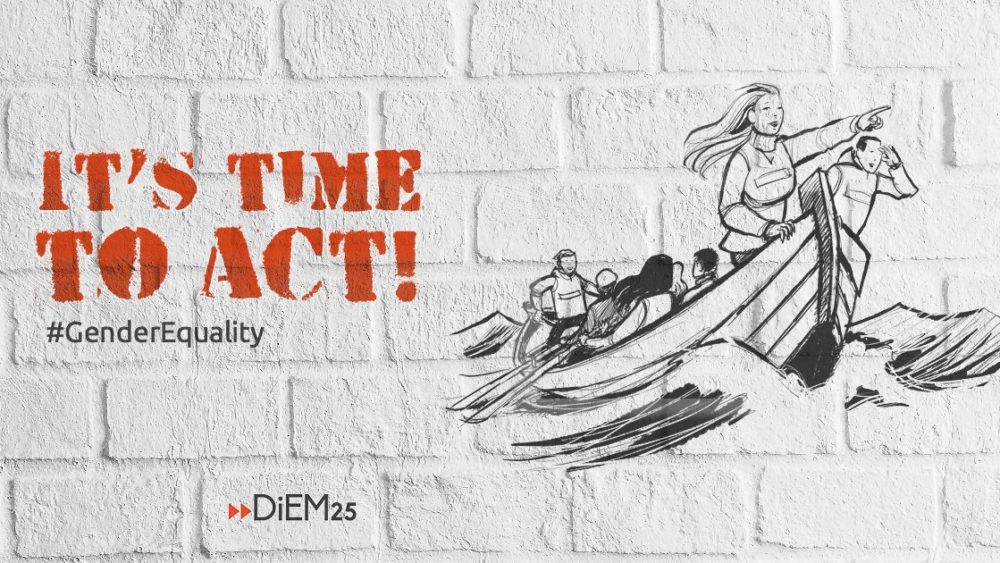In her 2012 book of the same name, Katrine Marçal asks the seemingly frivolous question: Who cooked Adam Smith’s dinner? 1
Smith famously noted that it wasn’t ‘from the benevolence of the butcher, the brewer or the baker that we expect our dinner, but from their regard to their own interest’. In other words, the butcher only provided Smith with a nice juicy steak because there was something in it for himself. What’s missing from this story, however, is who prepared that steak.
As Marçal goes on to note, Adam Smith lived most of his adult life with his mother, so it’s fairly safe to assume that it was she who cooked his dinner. But this fact doesn’t feature in Smith’s theory because unpaid work, invariably performed by women, isn’t recognised in conventional economics in the same way that remunerated labour is. In fact, women are often completely absent from discourse about economic theory and practice.
In the EU today, 72% of men (aged 15-64) and 61% of women are in some kind of formal employment. This is the work that is recognised by the European Commission and by the OECD, and which is accounted for in GDP figures. But it’s been estimated that, every day, women in OECD countries perform a further 272 minutes of unpaid work (4.5hrs), compared with the 138 minutes (2.3hrs) performed by men.
Interestingly, men and women do perform almost identical amounts of work in general: 466 minutes (7.8hrs) and 487 minutes (8.1hrs) per day respectively. But, whereas 70% of a man’s work is formally recognised, only 44% of woman’s is.
So what is all this work that women are doing that isn’t being recognised, and why does it matter?
Cleaning, cooking and childcare are all time-intensive activities that require mental and physical effort but which are mostly unpaid and usually done by women. Additionally, in our aging society, care of elderly or disabled relatives often also falls to women. While paid activity has been cast as ‘masculine’ (‘being the breadwinner’), care work has become a ‘feminised’ domain, and feminised attributes have historically been undervalued.
Such work is part of the ‘care economy’, or ‘reproductive economy’ and it is vital for the functioning of capitalism. Globally, women are, on the whole, responsible for generating and nurturing (feeding, clothing, teaching) the future workforce, i.e. ‘reproducing’. Without this human capital, the system collapses. But there is no remuneration for producing and raising tomorrow’s factory workers, technicians or bankers; reproductive work is expected to be delivered for free.
This might all sound academic. Work is work regardless of who does it, and in an equal society, surely everything will come out in the wash. But there are very real impacts from the ‘invisibility’ of women’s labour.
The more time a woman spends on unpaid work, the more likely she is to be engaged in part-time or temporary paid work. Such work is often less skilled, low-income, casual and insecure. Analysis shows that, in countries where women perform twice as much caring work as men (for example Austria and the Netherlands), they earn just 65% of what their male counterparts earn for the same job. Many women, for whom care work is seen as their priority, are subject to ‘occupational downgrading’ in which they accept work that is below their skill level and with poorer working conditions. As a consequence, they have fewer opportunities to ascend to higher and management-level positions. This renders women vulnerable to financial insecurity and poverty. Women with no or few personal assets are at risk of exploitation and gender-based violence.
Finally, not being part of the labour market has an impact even once a woman has passed retirement age. In Germany, there has been great discussion about whether Hausfrauen (housewives) should automatically receive a pension.
And there are far more conventional concerns about the impact of ignoring unpaid work on the economy. If unpaid care work were included, the GDP per capita of Italy would increase from 56% of the US’s GDP to 79%. Such omissions result in a distorted picture of the material wellbeing of households and the wealth of societies as a whole.
Ideas like universal basic income or a basic dividend, as espoused in DiEM25’s New Deal, have the capacity to go some way to redressing the balance. By providing all citizens with a guaranteed income, women become less dependent on wage-earning partners, and, by potentially reducing the number of hours people have to work in the formal economy, responsibilities for care work may be better shared.
But currently our European New Deal makes no mention of unpaid labour, or indeed women. As a progressive movement, proposing some of the most radical and interesting ideas in Europe, DiEM25 must make greater efforts to call out gender-specific economic inequality. This cannot be a sop or a nod to feminist theory – DiEM25 must take gender into account at every level of its policy and decision-making. Our movement must assess the impacts of all its policy proposals on both men and women, and to ensure that gender is not regarded as a kind of ‘bolt-on’ to existing policy.
On a broader level, breaking down gender norms and recasting care work as the responsibility of both men and women will, ultimately, give some of humanity’s most important activities the value and status they deserve.
Kate is a member of DiEM25’s DSC Gender Equity 1. The thematic DSC on Gender Equity has recently been established to address issues relating to the care economy, women’s rights in Europe and gender balance within DiEM25 at all levels. If you would like to be involved in the thematic DSC, or for more information, please send us an e-mail.
Artwork: Wilfred Hildonen (DiEM25 Communications)
[1] Marçal, K. (2012), Who Cooked Adam Smith’s Dinner?, Portobello Books.
Do you want to be informed of DiEM25's actions? Sign up here










